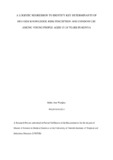| dc.description.abstract | In 2014, Joint United Nations Programme on HIV/AIDS (UNAIDS) estimated that 36.9 million people are living with HIV in the world. In that same year, there were 106 000 new infections in Kenya where 38% of the new infections were among youth aged 15-24 years. Consistent and correct use of condoms has been shown to be the single most effective means of preventing transmission of HIV and other sexually transmitted infections (STIs) among sexually active individuals. A study conducted in Kenya, revealed that comprehensive HIV knowledge increased from 9% in 1993 to 54% in 2008/09. As of 2014, only 30% and 37% of young women and young men, respectively, have comprehensive knowledge on HIV globally. In addition, only 40% of young women used condoms during their last sexual encounter as compared to 59% of young men.
Currently, there are few up-to date studies on sexual behaviour, risk perception and knowledge of HIV especially in Kenya. As such, objectives of the study is to analyse the determinants of condom use among young people in Kenya while identifying the socioeconomic, cultural, biological, and behavioural factors influencing condom use
A total of 2078 young people between the ages of 15-24 years were included in the study. Kenya AIDS Indicator Survey (KAIS) 2012 was utilized, which is a nationally representative population-based survey.
Descriptive statistics was performed to determine the characteristics of the sample used. Multivariate logistic regression was used to determine the factors influencing risk perception and condom use. Multivariate analysis revealed that number of sexual partners, having received money, gifts or favours in exchange for sex; female gender; and history of STI symptoms were significantly associated with risk perception. Knowing where to get
condoms, number of lifetime sexual partners, marital status and level of education were significantly associated with having ever used a condom. | en_US |
| dc.description.department | a
Department of Psychiatry, University of Nairobi, ; bDepartment of Mental Health, School of Medicine,
Moi University, Eldoret, Kenya | |

